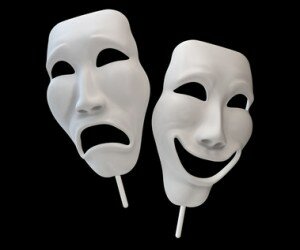 I am sure you can imagine that the fear of being ridiculed is something we can pick up at school.
I am sure you can imagine that the fear of being ridiculed is something we can pick up at school.
For example, there was once a seven year old boy who was given the part of Jesus in the school nativity play, just because he was top of the class academically.
When it was clear his acting abilities weren’t up to it, he was demoted to the role of an innkeeper. He was not even able to get his one line right of, “There’s no room at the inn”.
As a result, he ended up on the back row of the chorus, as an angel without any wings.
Fear of Public Speaking
This type of experience might sound comical but it can lead later in life to a fear of public speaking. Nobody wants to be made a fool or, or receive a bad review, so we avoid sticking our head above the parapet. The best and simplest way by far to avoid being ridiculed is not to perform in the first place.
Tomorrow is the first ever Mindful Writing Day, organised by our uber-creative friends, Kaspa & Fiona, over at Writing Our Way Home.
To join in, take a moment tomorrow to:
What Fiona and Kaspa call Small Stones are easy to write, and help you connect to your own life. Once you’ve written one, you may not stop…
You can also submit your small stone and see it published on the WYWH blog — and be entered into a competition to win one of five paperback copies of the book.
More details about mindful writing and small stones can be had in Fiona’s book, Write Your Way Home. And more on Mindful Writing Day: here.
PS Here’s a Facebook invite if you’d like to invite your friends.
And a tweet to send, if you’re twitter inclined: Connect with your life through mindful writing – first Mindful Writing Day on the 1st of Nov: bit.ly/VjzRKe #smallstone
 DANIEL PINK: “The paradox of prosperity is that while living standards have risen steadily decade after decade, personal, family, and life satisfaction haven’t budged.
DANIEL PINK: “The paradox of prosperity is that while living standards have risen steadily decade after decade, personal, family, and life satisfaction haven’t budged.
“That’s why more people – liberated by prosperity but not fulfilled by it – are resolving the paradox by searching for meaning. As Columbia University’s Andrew Delbanco puts it, “The most striking feature of contemporary culture is the unslaked craving for transcendence.”
“Visit any moderately prosperous community in the advanced world and along with the plenteous shopping opportunities, you can glimpse this quest for transcendence in action. From the mainstream embrace of once-exotic practices such as yoga and meditation to the rise of spirituality in the workplace and evangelical themes in books and movies, the pursuit of purpose and meaning has become and integral part of our lives.
People everywhere are moving from focusing on the day-to-day text of their lives to the broader context.”
From A Whole New Mind
You were born with a mouth,
a tongue,
and two sets of teeth were given,
the first by year two,
then at seven. All thought through,
to feed as you need
and tell of it too. Now
please do.
by Orna Ross
Better known to many as The Bookwright, Tom is a poet, author, coach, unblocker and creative catalyst, specialising in helping people tap into their creative intelligence.
“I work author-centrically,” says Tom. “And I love seeing the transformation in people from non-author to author, seeing how this transforms their personal life and business opportunities.
You could even say I work on the ‘book’ that is the author’s life.”
Tune in to Tom’s creative inspiration here every second Wednesday.
Everybody is a genius. But if you judge a fish by its ability to climb a tree, it will spend its whole life thinking it is stupid.” Albert Einstein.
1. What is Creative Intelligence?
By definition, the creative is unconventional, anarchic, flexible, open and difficult to pin down. What the concept of creative intelligence does is enable us to understand and apply this dimension of human life that can sometimes feel so erratic or nebulous.
We are all creating all the time — both consciously and unconsciously – but our understanding of how, and our confidence in the process, has been suppressed in us (see 6 & 7 below).
2. Can you give me a definition?
Human intelligence is the capacity for knowing and learning. Creative intelligence is a vital dimension of that capacity. It is fostered through understanding how the creative process works in human beings and how to apply it.